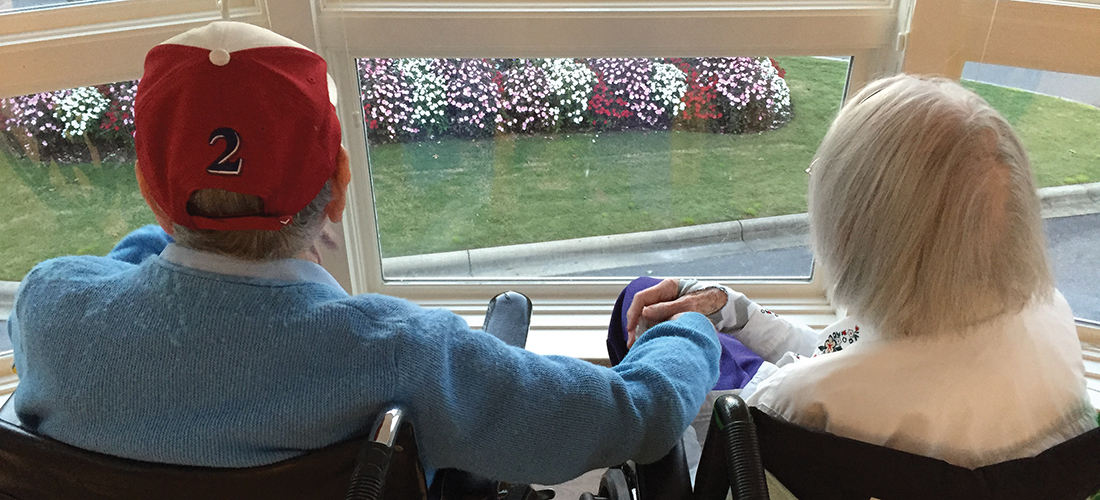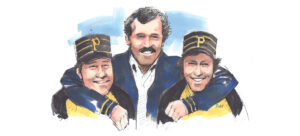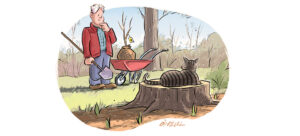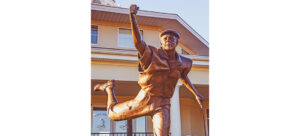
Keeping memories for two
By Jim Moriarty
Near the end of the day, on the top floor at St. Joseph of the Pines, a man who spent much of his working life in a research laboratory places his wheelchair directly behind the wheelchair of his wife, whose mind has wandered into the mists of age, and puts to fair use the laws of force and motion. With him supplying the force and her the motion, they roll in tandem down the hallway to the sunroom, where he parks them side-by-side so they can look through the broad windows at sunset.
Robert Lamar Whittle — “Just like whittling a stick,” he says as if he was saying it for the first time — turned 99 in October. He goes by Lamar because his father had a prior claim on Bob. Edna, his wife, is 97. They met at a church Christmas party in Sylvester, Georgia. So far it’s lasted 74 years.
Mr. Whittle remembers his father’s sawmill near Cedar Key on Florida’s Gulf Coast and the springs near the mouth of the Suwannee River. “The water was so clear you could see the white sand in the bottom 50 feet from the shore,” he says. The lumber business went bust in 1929, sending the family north into Worth County, Georgia.
Mr. Whittle remembers for two now, and he remembers pretty much all of it. He worked his way through Berry College in Rome. “It’s still there,” he says. “Still functioning.” When World War II began, the War Manpower Commission put his name on a list of scientific and technical people. “When the Manhattan Project was begun, I was sent down to Columbia University and I spent the rest of the war years there,” he says. “The only uranium we had was in some barrels that were stored on Staten Island. The British had collected that uranium ore in the Congo. I don’t know if they were afraid the ship was going to be sunk by submarines, but they docked it there on Staten Island and unloaded the uranium. I didn’t play much part in the development of the bomb. I worked mostly on magnetic detection of submarines.”
After the war, Mr. Whittle worked with ITT laboratories in Nutley, New Jersey. He and Edna, the dedicated gardener, had three daughters, who all live in North Carolina now. When the researching days were done, they retired to Georgia to raise peaches. But, the next time your commercial airliner drops out of the clouds and touches down on a wet runway like a butterfly, remember Mr. Whittle. “One of the developments that I think was most important was the instrument landing system for aircraft,” he says. That came shortly after the war, 1946 or so. It’s one of the few details he can’t quite lay his hands on. “That became the worldwide standard for blind landings of aircraft. I participated in the demonstration of that in Indianapolis.”
One of the researchers Mr. Whittle worked with at Columbia was Gene Fubini. “He was scientific adviser to Jack Kennedy when Kennedy was president,” says Mr. Whittle, and then for President Johnson, too. His father was the Italian mathematician Guido Fubini, who has his very own theorem. “I’ve been with a lot of really first-class people. We were sitting around the table one time discussing a project the military wanted us to do and Gene said, ‘Fellas, before we take on any other projects, it ought to meet three criteria. The first is, is it a job that needs to be done? Some of these are just trivial and a waste of time. Number two, are we the ones to do it? Maybe there’s somebody else better equipped than we are. And third, and most important, is there going to be any fun in it? If there’s not going to be any fun in it, don’t do it.’
“So,” says Mr. Whittle, “I remembered that. If there’s not going to be any fun in it, don’t do it.”
Time is the gift wrapped in uncertainty, that we make of what we can. He takes Edna’s hand because hers shakes. “It’s been a good life, I’ll tell you.” PS
Jim Moriarty is Senior Editor of PineStraw and can be reached at jjmpinestraw@gmail.com.





